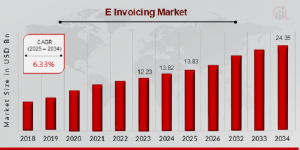E Invoicing Market Predicted to Hit 24.35 Billion by 2034
The global e-invoicing market is growing rapidly, driven by automation, compliance needs, and digital transformation across industries.
The global E-Invoicing market has been gaining remarkable traction over the past few years, driven by digital transformation, regulatory compliance, and the growing demand for streamlined business operations. E-invoicing, or electronic invoicing, involves the digital exchange of invoice documents between a supplier and a buyer. It not only reduces paperwork but also minimizes manual errors, speeds up payment cycles, and enhances transparency in financial transactions. As more governments across the globe mandate e-invoicing for tax compliance and businesses increasingly shift toward cloud-based solutions, the market is poised for significant growth
Download Sample Pages: https://www.marketresearchfuture.com/sample_request/36022
Market Segmentation
The E-Invoicing market can be segmented on the basis of deployment mode, end-user industry, and region. Based on deployment, the market is categorized into cloud-based and on-premises solutions. Cloud-based e-invoicing solutions are gaining immense popularity due to their scalability, flexibility, and cost-effectiveness, particularly among small and medium-sized enterprises (SMEs) that lack extensive IT infrastructure. On-premises solutions, while less common, are still preferred by large enterprises requiring stringent data control and customization. By end-user, the market serves a broad range of sectors including BFSI, retail, government, energy & utilities, IT & telecom, and manufacturing. The BFSI sector holds a significant share due to its high volume of transactions and the need for strict compliance standards. Meanwhile, the government sector is also witnessing accelerated adoption, driven by e-invoicing mandates in countries like India, Italy, and Brazil.
Market Key Players
Several key players dominate the competitive landscape of the E-Invoicing market, offering innovative platforms and robust integrations that cater to a wide spectrum of business needs. Leading companies such as:
• Oracle
• com
• Invoice2go
• PwC
• Zahara
• SAP
• FinancialForce
• Coupa
• eBillity
• Sage
• EY
• Xero
• Deloitte
• Basware
• Tradeshift
Browse In-depth Market Research Reports On E Invoicing Market: https://www.marketresearchfuture.com/reports/e-invoicing-market-36022
Market Opportunities
The E-Invoicing market presents several growth opportunities in both developed and emerging markets. One of the most significant opportunities lies in the increasing regulatory push for mandatory e-invoicing. Governments in regions like Europe, Latin America, and Asia-Pacific are implementing strict regulations to curb tax evasion, improve compliance, and ensure faster revenue collection. This trend is creating a fertile environment for e-invoicing vendors to expand their presence. Additionally, the rising adoption of digital transformation initiatives by enterprises and the integration of e-invoicing solutions with enterprise resource planning (ERP) systems are expected to unlock new business avenues. Another promising opportunity stems from the increasing demand for mobile-compatible e-invoicing solutions, especially with the growing number of remote and hybrid work models. Furthermore, the need for cross-border transaction transparency is pushing global organizations to invest in interoperable e-invoicing systems, thus driving demand in the international market.
Restraints and Challenges
Despite the numerous advantages and opportunities, the E-Invoicing market also faces a set of challenges and restraints that could hamper its growth. One of the primary concerns is the lack of standardization across countries and industries, which complicates the implementation of e-invoicing systems, especially for multinational organizations. The initial cost of deployment and integration with existing systems can be high, particularly for SMEs with limited budgets. Resistance to change and lack of awareness about the benefits of e-invoicing also serve as significant hurdles. Security concerns related to data privacy and cyber threats further restrain some organizations from fully embracing digital invoicing solutions. Moreover, varying tax regulations and compliance requirements across different regions add complexity to the implementation process, thereby slowing down widespread adoption.
Procure Complete Research Report Now: https://www.marketresearchfuture.com/checkout?currency=one_user-USD&report_id=36022
Regional Analysis
Geographically, the E-Invoicing market is segmented into North America, Europe, Asia-Pacific, Latin America, and the Middle East & Africa. Europe currently leads the market, driven by widespread regulatory mandates and the early adoption of digital financial technologies in countries like Germany, France, and Italy. The European Union’s push for a unified e-invoicing standard across member states is expected to further strengthen market growth in the region. North America follows closely, with strong demand from the United States and Canada where businesses are increasingly prioritizing automation and operational efficiency. The Asia-Pacific region is anticipated to witness the fastest growth over the forecast period due to rapid digitalization, government support for electronic transactions, and the presence of large developing economies such as China and India. Latin America is also emerging as a significant market due to progressive regulatory frameworks in countries like Brazil and Mexico. Meanwhile, the Middle East & Africa region is gradually catching up, as businesses and governments begin to realize the long-term cost benefits and efficiency gains offered by e-invoicing solutions.
Recent Developments
The E-Invoicing market has seen several notable developments in recent years, reflecting the dynamic and rapidly evolving nature of the industry. Many market leaders have launched advanced AI-powered invoice processing features that can automatically validate, process, and route invoices with minimal human intervention. Strategic partnerships and mergers have also been on the rise. For instance, companies are collaborating with fintech firms and ERP solution providers to expand their product offerings and integrate e-invoicing with broader financial ecosystems. Governments are playing an increasingly active role by issuing new mandates, offering compliance platforms, and working with private sector players to build robust digital infrastructures. Technological advancements in blockchain, API connectivity, and real-time data exchange have also started to make their way into e-invoicing platforms, ensuring greater transparency and security. These developments indicate a strong momentum toward a more connected, automated, and compliant future for invoice management across the globe.
Related Reports:
Energy Security Market:
https://www.marketresearchfuture.com/reports/energy-security-market-26621
Augmented Reality Glas Market:
https://www.marketresearchfuture.com/reports/augmented-reality-glas-market-26402
Cloud Logistic Market:
https://www.marketresearchfuture.com/reports/cloud-logistic-market-26413
Commodity Supply Chain Management Solution Market:
https://www.marketresearchfuture.com/reports/commodity-supply-chain-management-solution-market-26483
Computational Fluid Dynamic Market:
https://www.marketresearchfuture.com/reports/computational-fluid-dynamic-market-26503
Global Mining Shovel Market Poised for USD 11.9 Billion Milestone by 2035 with Electrification and Global Demand Surge
Updated Links: Weiner Team on London Times Radio, US Main Street Radio; Op-Eds on Marijuana, College Cost, Trump Fatigue
Future of Work Events Announces Executive Women's Symposium in Chicago August 7-8, 2025
Kalendarium
Więcej ważnych informacji
 Jedynka Newserii
Jedynka Newserii

 Jedynka Newserii
Jedynka Newserii

Handel

Ze względu na różnice w cenach surowce wtórne przegrywają z pierwotnymi. To powoduje problemy branży recyklingowej
Rozporządzenie PPWR stawia ambitne cele w zakresie wykorzystania recyklatów w poszczególnych rodzajach opakowań. To będzie oznaczało wzrost popytu na materiały wtórne pochodzące z recyklingu. Obecnie problemy branży recyklingu mogą spowodować, że popyt będzie zaspokajany głównie przez import. Dziś do dobrowolnego wykorzystania recyklatów nie zachęcają przede wszystkim ceny – surowiec pierwotny można kupić taniej niż ten z recyklingu.
Przemysł spożywczy
Rośnie presja konkurencyjna na unijne rolnictwo. Bez rekompensat sytuacja rolników może się pogarszać

Rolnictwo i żywność, w tym rybołówstwo, są sektorami strategicznymi dla UE. System rolno-spożywczy, oparty na jednolitym rynku europejskim, wytwarza ponad 900 mld euro wartości dodanej. Jego konkurencyjność stoi jednak przed wieloma wyzwaniami – to przede wszystkim eksport z Ukrainy i niedługo także z krajów Mercosur, a także presja związana z oczekiwaniami konsumentów i Zielonym Ładem. Bez rekompensat rolnikom może być trudno tym wyzwaniom sprostać.
Transport
Infrastruktury ładowania elektryków przybywa w szybkim tempie. Inwestorzy jednak napotykają szereg barier

Liczba punktów ładowania samochodów elektrycznych wynosi dziś ok. 10 tys., a tempo wzrostu wynosi ok. 50 proc. r/r. Dynamika ta przez wiele miesięcy była wyższa niż wyniki samego rynku samochodów elektrycznych, na które w poprzednim roku wpływało zawieszenie rządowych dopłat do zakupu elektryka. Pierwszy kwartał br. zamknął się 22-proc. wzrostem liczby rejestracji w ujęciu rocznym, ale kwiecień przyniósł już wyraźne odbicie – o 100 proc.
Partner serwisu
Szkolenia

Akademia Newserii
Akademia Newserii to projekt, w ramach którego najlepsi polscy dziennikarze biznesowi, giełdowi oraz lifestylowi, a także szkoleniowcy z wieloletnim doświadczeniem dzielą się swoją wiedzą nt. pracy z mediami.









.gif)

 |
| |
| |
|